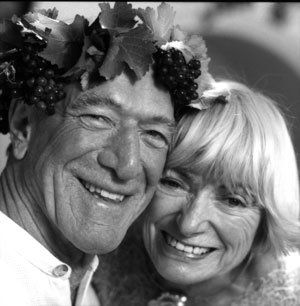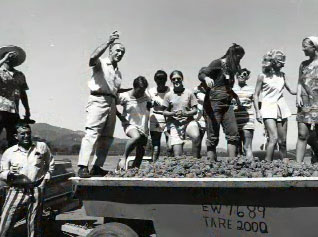
|
| Robert Mondavi as Bacchus, with wife Margrit. Photo: Avis Mandel for Pate International |
During the three years it took to research and write The House of Mondavi, I interviewed hundreds of people, poured through legal and corporate documents, and studied old photographs from high school yearbooks and other fragments of the past, searching for clues about Robert Mondavi’s character. Along the way, I gained an enormous respect for his passion, his perseverance, and his joie de vivre.
I was lucky enough to have the last formal interview Robert Mondavi ever granted to a writer. Our meeting took place in a second floor conference room of the Robert Mondavi Winery in Oakville on March 29, 2005, nearly four months after the forced sale of the Robert Mondavi Corporation. Although the sale proceeds helped Mr. Mondavi fulfill his many philanthropic pledges, it also put him out of the wine business for the first time since the 1930s. It was a sad spring for Mr. Mondavi, then 91, and his wife Margrit and I left that interview feeling as if Robert Mondavi was already beginning to slip away.
I wish I had met Mr. Mondavi a decade earlier, when I could have felt the energy and charisma of this first-generation Italian-American for myself. Recognizing this limitation, I turned to others to help describe for me the qualities that made his employees loyal to him in a way I had never seen before in more than two decades of corporate reporting. Through other people’s memories, I tried to paint a portrait of a man who seemed decades younger than his chronological age, perhaps because of his happy second marriage to Margrit.
His former employees and old friends told me how he swam forty laps nearly every day well into his seventies – and never took up golf because it was too leisurely for him. He seemed to drive faster and faster as he got older, until finally his family and colleagues insisted the winery provide him with a driver and a car. He was a brilliant marketer whose charisma and high energy drew all sorts of glamorous people into the winery’s orbit: Natalie Wood and Robert Wagner on a sunset cruise in Hawaii, the author Danielle Steele to his and Margrit’s Napa Valley home known as Wappo Hill, and even the red-haired entertainer Ann-Margret in Las Vegas.

|
| Robert supervises a grape stomp at the first harvest of Robert Mondavi Winery. Photo: Arlene Bernstein for Pate International |
But far more telling than Robert’s charisma was his sheer perseverance in the face of obstacles. One story comes to mind from Robert’s nephew, Peter Ventura. Because he felt that his family had tried to take advantage of him in connection with his stake in the Charles Krug winery and other family holdings, Robert decided to sue his mother, brother, and sisters in a case that would become famous in California.
During the trial in 1976, Peter spent a fitful night with Robert and his first wife Marjorie at their home on the Charles Krug compound. He heard a strange thumping sound and wondered what it could be. Finally, he realized Robert was hitting the soft part of his fist against the wall as he paced the hallway outside the room where Peter was trying to sleep.
He knew that because he could hear his uncle repeating, over and over: “Only the strong survive, only the strong survive, only the strong survive.” Robert won the Mondavi vs. Mondavi case and the judge’s decision handed him a complete moral vindication.
Frank J. Prial, who was chief wine critic for The New York Times for many years, wrote Mr. Mondavi’s obituary in Saturday morning’s paper. His excellent story notes that “Mr. Mondavi was a master of the grand gesture. He championed California but led his employees on grand tours of Europe to see how other fine wines were made. Guests at Mondavi lunches found themselves sampling up to two dozen of the rarest French wines, opened to show that they were no better than California’s best. Many of America’s renowned winemakers trained at Mondavi.” That’s why the Robert Mondavi Winery got the nickname “Mondavi University.” And to this day, there is still a large and very loyal group of former employees who gather once a year for a reunion and keep in touch through a Yahoo! group.
Some of the photographs I gathered from old friends, such as Arlene Bernstein and long-time label designer Susan Roach Pate, express most clearly for me the seemingly boundless energy that Robert Mondavi had in his prime. These photos not only capture the spirit of a moment in the history of the American wine industry, but the spirit of a very complex man. Mr. Mondavi led a long, rich, fascinating life. I feel honored to have had the chance to chronicle his life and times.